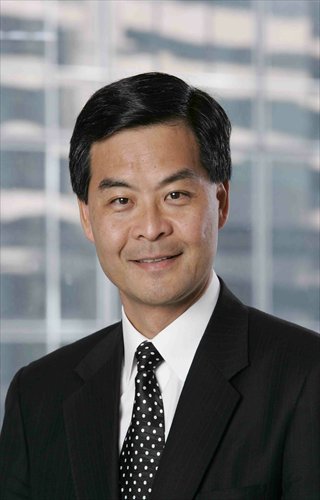HK takes stock of strong 15-year journey

Leung Chun-ying (梁振英)
Editor's Note:
July 1 will be the 15th anniversary of Hong Kong's return to China. Leung Chun-ying (Leung), incoming chief executive of Hong Kong Special Administrative Region (SAR), won the election for the nomination with 689 votes out of 1,200 three months ago. What are his plans for Hong Kong? How can ties to the mainland be strengthened? People's Daily (PD) talked to Leung on these issues.
PD: July 1 will mark the 15th anniversary of Hong Kong's return to China, and you will officially take over as chief executive for Hong Kong SAR on that day. What do you think of Hong Kong's return and its development during the past 15 years?
Leung: Hong Kong's return has two aspects. First, it was guaranteed by the legal documents. According to the Sino-British Joint Declaration signed in 1984, the Chinese government was to resume its sovereignty over Hong Kong in 1997, after a 13-year transitional period.
The Hong Kong SAR was established based on the principle of "one country, two systems" and "Hong Kong people governing Hong Kong" with a high degree of autonomy. The development of Hong Kong during the past 15 years has well demonstrated the greatness of the "one country, two systems" idea.
The second aspect is the return of Hong Kong people's hearts. After all, Hong Kong was ruled by the British government for over a century.
We still need to put great efforts on national education guiding Hong Kong people to know Chinese history and its development. It will be a long-term process.
Today, it is convenient for mainlanders to come to Hong Kong, and vice versa. But this was not true until recently. Before 2003, the individual visits were not allowed to Hong Kong, thus making group trips the only choice for mainlanders.
When I was 23 years old, I finished my education in Britain, and came back to Hong Kong. I volunteered to join a city-planning program in Shenzhen. Back then, there were around 40 people per day coming to Shenzhen. Now, the number has increased to 200,000 people per day.
To understand the relationship between Hong Kong and the mainland, we need to view it from a higher point, instead of scratching the surface. Hong Kong had been separate from the mainland for over a century, and accumulated problems were left over. We should not ignore these problems, but tackle them step by step.
PD: What brought you victory in the election for chief executive of Hong Kong SAR?
Leung: According to the current election system, the candidate for chief executive of Hong Kong SAR is selected by 1,200 election committee members, and is then appointed by the Chinese central government.
I fully realize that as chief executive of Hong Kong SAR, the people's support is paramount. Therefore, during the election process, I interacted a lot with Hong Kong people, not only to publicize my political proposals, but also to get feedback and wisdom from them.
Hong Kong has made huge improvements over the past 15 years, but social problems have also accumulated. More and more Hong Kong people appeal for change. Under the circumstances, I proposed that we should pursue changes steadily and fairly.
PD: You said that you will make great efforts to improve civil livelihood. How will you put this into practice?
Leung: Today's Hong Kong is an international metropolis. But I remember that when I graduated from elementary school, more than half of my classmates did not get the chance to pursue further education.
Also, a large number of Hong Kong people of my age are still manual workers earning low incomes. Issues such as housing, pension, and healthcare are still serious.
Hong Kong enjoys a relatively high level of economic development. But the wealth gap is large.
In 2011, we improved the distribution system by legal means, and the relevant law was enacted on May 1 last year. Economic development and distribution need to be well balanced.
PD: How can Hong Kong take advantage of its strengths?
Leung: According to the 12th Five-Year Plan, the central government promises to support Hong Kong in maintaining and upgrading its status as a center of international finance, international trade, and international shipping. Here what do we mean by upgrading business? It is worth thinking about. If we simply double the cargo handling capacity, then it means expanding business volume, rather than real upgrading.
Both Hong Kong and London are international shipping centers. But compared with Hong Kong, London has no harbors but only the Thames.
London's focus is not shoreside operations, but vessel management including purchase, rent, registration, financing, loan, insurance, legal services, and so on. So here lies the gap. Their work is more technology-oriented with higher economic output and higher incomes.
If Hong Kong could gradually develop as an international center like London, that would mark the real "upgrade."
Now, China is on its way to being a great maritime power. Therefore, an international shipping center like London is badly needed.
Hong Kong has great potential in this regard, and is the most competitive city out of 600 others in China. This is a positive situation, and I believe that Hong Kong will not disappoint the mainland.